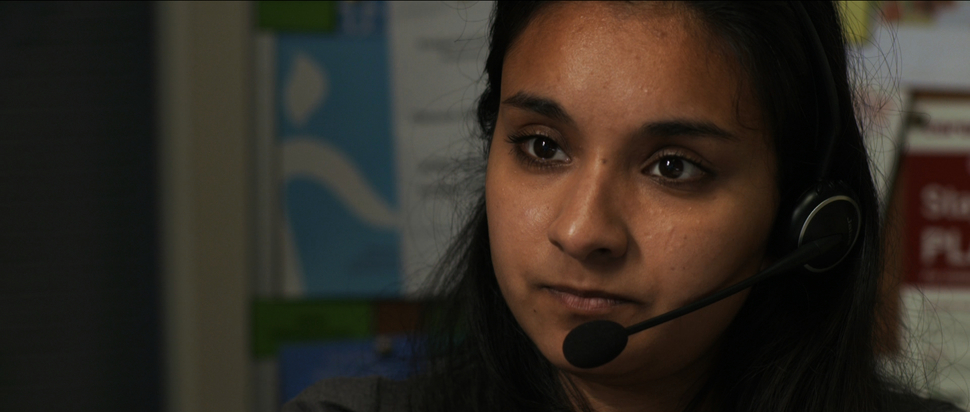Petra Bauer: Sisters! @ Fruitmarket, Edinburgh
Swedish artist and filmmaker Petra Bauer’s film is a powerful look at the day-to-day work of Southall Black Sisters
[Content warning: mentions violence against women, including rape]
Petra Bauer’s feature documentary Sisters! (2011) is shown on a large screen at the Warehouse of Fruitmarket. The film was made in collaboration with Southall Black Sisters (SBS), a London-based activist organisation, which, for over 40 years, has advocated for the rights of Black and minority women in the UK. The installation features a red carpet and chairs, a colour that, for the artist, symbolises protest, love and joy.
The film focuses on the daily operations within the organisation's offices. We gain insight into snippets of conversations among colleagues, as well as phone calls from women seeking support. Although the voices of the women on the other end are never heard, it's clear that the topics discussed primarily pertain to issues of male violence against women, including domestic violence and rape. There are also scenes where the narrative becomes more cohesive: discussions about the values of SBS, moments of respite over lunch and a cup of tea, and celebrations of both small and bigger victories.
Sisters! employs several techniques reminiscent of Nightcleaners by the Berwick Street Collective (1975), a landmark Marxist-feminist documentary made to support the unionisation of the women who cleaned office blocks in London during the night. Both films are carefully constructed to avoid the observational documentary style, which suggests an invisible camera, an omnipotent director, and an easily accessible truth.
It is evident that the film underwent significant editing. Sisters! is composed of silences, interruptions (pillar shots), black frames, and an interplay of close and long shots, all of which emphasise the film's constructed nature. Bauer compiles instances that highlight the long history of misogyny, including references to laws and state policies that leave women vulnerable to violence. These techniques do not dilute the matter-of-factness of the violence against women but reveal the reason why SBS exists in the first place: the intersection of misogyny, classism, racism, and religious fundamentalism. Piecing together elements that speak to the truth is, I believe, the political work that the documentary genre can do. The accompanying written material, placed near the screen at Fruitmarket, does a good job of conveying the relevance of the film to the current state of feminist struggle.
Towards the end when the film ventures outdoors for the first time after 50 minutes, three long-standing members of SBS share their old banners with the camera. As they remember protests from decades ago, they reflect on their enduring relevance. “Where have all those years of consciousness-raising gone?” Pragna Patel, a founding member and director of SBS, poignantly wonders. Sisters! is not a documentation of the past or an aesthetic experiment; rather, the film underscores the importance of feminist politics amidst the insidious ideology of post-feminism – a eurocentric and classist belief that women have attained their rightful place in society.
The film culminates in a party scene that bursts with colour, movement, and noise for the first time. It's a celebration. Patel delivers a speech about the endurance of the feminist struggle against deeply asymmetric forces of oppression. Then there is dance and flickering, colourful lights that gradually envelop the entire screen. Just as I thought the film should end in this moment of joy, the sudden transition to the offices of SBS made sense. The film ends as it began, with seemingly mundane administrative tasks and the same phone conversations: “For how long has this been happening?” Stripped of colour and sound, this final scene is draining. Violence against women is so pervasive and so deeply ingrained that the administrative banality and dispassionate, menial tone of the opening scenes hadn’t left me feeling uneasy.
Petra Bauer: Sisters!, Fruitmarket, Edinburgh, until 23 Mar, open daily
